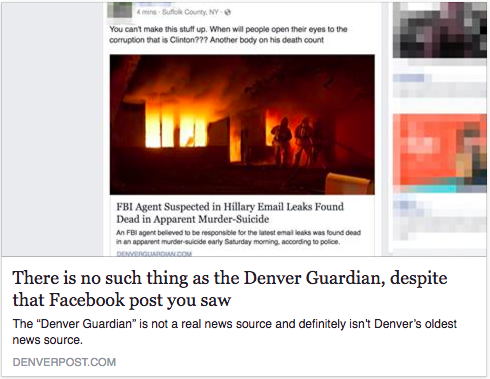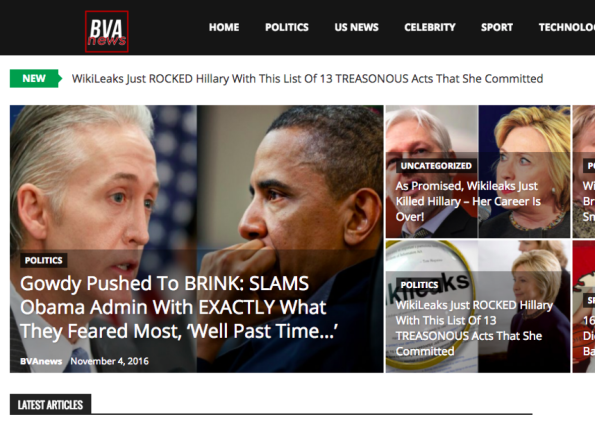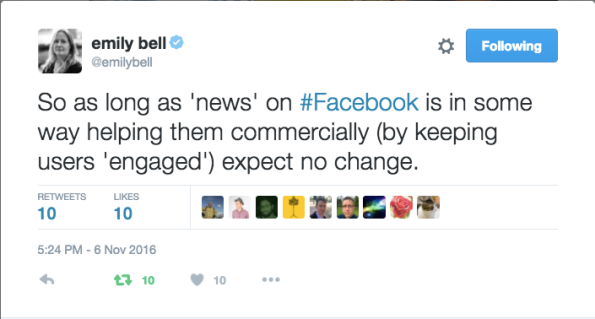Fake News, False Information, and Stupid Polls
Fake News
Facebook uses an algorithm to decide what you see. It’s proprietary but my guess it’s optimized to keep you on Facebook for as long as possible.
This wouldn’t be a problem but becomes one when we realize that people get their news from Facebook.

When you optimize to something, and when you ignore something else, that other thing can be expected to balloon beyond recognition. We’ve seen that with ballooning tuition for colleges because of the US News & World Report, for example.
In this example, the thing Facebook has ignored is “truth.” The result is a proliferation of fake news:

False Information
Beyond simply fake news, there’s tons of hyper partisan articles that make use of false information. These pseudo-news sites have popped up simply to exist on Facebook and to game the Facebook algorithm.

When Facebook started 12 years ago, there was a much healthier journalism industry. It’s now much less healthy, in no small part because of the ad dollars that now pour into Facebook. What will another 12 years bring? I’m worried that we won’t have real news anymore even if we search for it.

This is bad for democracy, because people are constantly being misinformed or hysterically informed. It’s pushing people further into their corners, or pushing them off of Facebook and politics entirely.
Stupid Polls
Finally, the polling conversations are out of hand. We tune into our favorite radio shows to hear about policy and instead we hear about poll numbers, or even worse, debates between poll watchers about whose poll is more accurate. That’s not news.
We have obsessed over the college educated white Iowan women’s vote for long enough, and we need to enter a new phase where we discuss actual issues. Leave the polling to campaigns. Mona said it best:
What can we do?
Here are some ideas that might help a little but won’t solve everything. Tell me yours.
- Facebook absolutely must acknowledge its role in the spread of misinformation. They need to act as editors. This will take an army of workers, but there are plenty of journalists who are looking for jobs, and Facebook makes tons of money, so there’s no actual problem besides the will of Facebook.
- Beyond that, Facebook needs to redesign its algorithm so that people don’t only see things they already agree with. This echo chamber (or “filter bubble,” as Eli Pariser described it in his 2011 book) has had a terrible effect on political partisanship. We’ve ended up thinking people who don’t agree with us are actually bad people. Facebook should redesign its platform so that we talk and listen to each other more.
- We need to demand that media stop fixating on polls. If we can’t outlaw them, at the very least we can complain and move our attention to real information.



Love this! I feel like I could have written it. I’ve been saying all election that I believe the self-affirming feedback loop on FB news is contributing to the intolerance for others’ opinions and views. A person can start to believe they represent “the middle”, because that’s the feedback they get
LikeLike
Nice, concise writeup. We can also just stop reading that stuff, or simply quit FB. Something I’m personally considering.
LikeLike
One more thing: at this point, fake news is a big problem even if you never use social media. Because there’s such a huge incentive to create this crap to distribute via Facebook and other similar channels, it seems like we have orders of magnitude more of it than we used to, and once produced, it quickly spreads beyond social media via emails, crappy news aggregator sites, etc. I have been getting way more stuff like this than I used to from people who don’t use Facebook at all, and I don’t think it’s just because the election is so contentious.
LikeLike
I call this false news, propaganda, but this is propaganda that supports the agendas of corporate/political special interest groups, extremists, and fools. For instance, Donald Trump is a false news, conspiracy creator and/or supporter assembly line all by himself. He spews so many lies as if they are facts in such a flood that he has overwhelmed the fact checkers, and fact checking has become a necessary segment of the news industry.
Here’s a list from Tech Norms of the top 6 fact-check sites.
http://www.technorms.com/454/get-your-facts-right-6-fact-checking-websites-that-help-you-know-the-truth
Then there’s one site that isn’t a fact checker. Vote Smart is where you find the actual facts about elected representatives in the United States: their bio, votes, positions, ratings, speeches; funding source.
https://votesmart.org/
For instance, during the debates, when Trump spewed one of his serial lies that Hillary Clinton never accomplished anything in her public life, that’s where I went to find out if it was a fact. I checked Clinton’s voting record as a senator on Vote Smart and discovered Trump was 100 percent wrong once again.
https://votesmart.org/candidate/key-votes/55463/hillary-clinton#.WCCNX_krKUk
LikeLike
2016 has been worse than usual. At this point, I just look at the given outrage of the moment people are whipping themselves into a froth over, and know it is either grossly misreported, or outright fake. It is a bit disconcerting to see people I know falling for it, though.
LikeLike
Oddly enough it appears that throughout their report Gottfried and Shearer (http://www.journalism.org/2016/05/26/news-use-across-social-media-platforms-2016/) are careful to write that people simply “get news” instead of “get their news,” except in the one sentence where this choice seems most called for. It appears in the subsection “Seeking out news online:”
“Differences also emerge in how active or passive each group of news users is in their online news habits more generally. YouTube, Facebook and Instagram news users are more likely to get their news online mostly by chance, when they are online doing other things. Alternatively, the portion of Reddit, Twitter and LinkedIn news users who seek out news online is roughly similar to the portion that happen upon it.”
LikeLike
Actually “see news” would have worked even better I think.
LikeLike
I am less angry with people who GET their news this way, and spread it, than I am with the person or organization who CREATED it. The recipient believes it – but the creator KNEW it was a lie when they wrote it, added some stock photos, and sent it out into the world.
I had a friend (he passed away recently – we were still friends) with different political leanings from mine, who would send me emails he got from HIS friends – emails full of made-up facts. I would provide links to fact-check sites, or snopes.com, and I think he usually believed me. But he still voted the wrong way!
LikeLike
“We need to demand that media stop fixating on polls. If we can’t outlaw them, at the very least we can complain and move our attention to real information.”
Polls satisfy the public’s insatiable desire to reduce every complicated issue to a number and to use those numbers to rank and sort… your reference to US News and World Report’s college rankings is exhibit A… with either the ridiculous insistence of State legislators to assign schools a “letter grade” OR the “reform” movement’s insistence that standardized tests be used to measure all kinds of school performance a close second…
LikeLike
Reblogged this on Network Schools – Wayne Gersen and commented:
AS I noted in the comment section, polls satisfy the public’s insatiable desire to reduce every complicated issue to a number and to use those numbers to rank and sort… her reference to US News and World Report’s college rankings is exhibit A… with either the ridiculous insistence of State legislators to assign schools a “letter grade” OR the “reform” movement’s insistence that standardized tests be used to measure all kinds of school performance a close second…
LikeLike
“… there are plenty of journalists who are looking for jobs, and Facebook makes tons of money, so there’s no actual problem besides the will of Facebook”
How about the problem of them spending money on things that *you* want and they don’t need?
LikeLike
How about instead letting people sue fake news producers for lying to the public? That should at least kill the outright lies.
LikeLike
Does anyone know whether the UK’s stricter libel laws have resulted in less inaccurate coverage?
LikeLike
A lot of the methods I use to guess whether a news article is plausible are pretty superficial (e.g. throw out all infographics and anything with an exclamation point or physical combat metaphor in the title) but I still think they help. Screening for implausible articles algorithmically doesn’t seem like total science fiction.
LikeLike
Make it a law that misinformation is against the law – propaganda of any kind by any person, organization or company can be sued by individuals who view it and can prove that it is incorrect. No need to prove intent, just that it is a lie and the companies (in the legal sense here) involved in it are culpable. Include the medium (in this case Facebook) in the culpable parties and I would bet all of this crap would disappear pronto. Go ahead, show an instance where misinformation *helped* anyone…
LikeLike
I escaped bookface some time ago when I saw that their algorithm was not working..or was working depending upon how we see things. They had me pegged ( I gathered from the ads. ) as a gay , young , fashion conscious boozer, rocker and doper. Not me at all. A sort of Doppleganger.
I find that Pinterest is also a mine of disinformation ; references to faux history and faux events are constant. And they seem to love their little meaningless charts with headlines bearing no reference at all to reality.
The fact is that the internet social media has become an outlet in information for the illiterate and ill informed.
They need to be reigned in , but I have no idea how that would be done. Since our society in general is built upon blame the other guy , I didn’t do it and don’t bother me with the facts.
LikeLike
I basically agree but I do think there’s something important about polls: they let people know that the other side has a lot of supporters too. Judging just from people I know, Trump would have no chance, but Brexit would have had no chance either. In both cases, I know from polls that the electorate is split roughly evenly. I think that helps with people accepting the legitimacy of election results and also with not getting complacent.
Polls are given too much emphasis — they don’t actually *matter*; they don’t *affect* things — but they need to be part of the available information.
LikeLike
I don’t think there’s much chance of getting FB or other sites to act as “editors” (#1 above) of “information” — it’s hard enough to get them to be editors of threats, harassment, incivility & the like. #s 2 & 3 might have some chance.
On separate note, American presidential campaigns need to be drastically shortened! Two years from now the 2020 campaign essentially begins — what a sickening thought!
LikeLike
If Facebook acted as an editor, they would lose the DMCA protection status that keeps them from being liable for everything their users write! I think the current legal framework pretty much makes what you want impossible.
LikeLike
I guess we need to change the law then.
LikeLike
It’s been a bad year for polls. “Mr Brexit” knew it would be and sure enough, he won!
LikeLike
These “news” are not even sponsored by Trump. They’re there for the ad dollars. Maybe you’re read the story by now, which I still find incredible:
https://www.buzzfeed.com/craigsilverman/how-macedonia-became-a-global-hub-for-pro-trump-misinfo?utm_term=.drvgoGmE5#.ln71x3N4n
“Several teens and young men who run these sites told BuzzFeed News that they learned the best way to generate traffic is to get their politics stories to spread on Facebook — and the best way to generate shares on Facebook is to publish sensationalist and often false content that caters to Trump supporters.
[…]
Earlier in the year, some in Veles experimented with left-leaning or pro–Bernie Sanders content, but nothing performed as well on Facebook as Trump content.”
LikeLiked by 1 person
Getting Facebook to hire editors and training them sounds like a great idea; much better than getting people to do it for free. They’re a media company company so they ought to face up to their responsibilities; and if they can’t, the law should get them to.
LikeLike